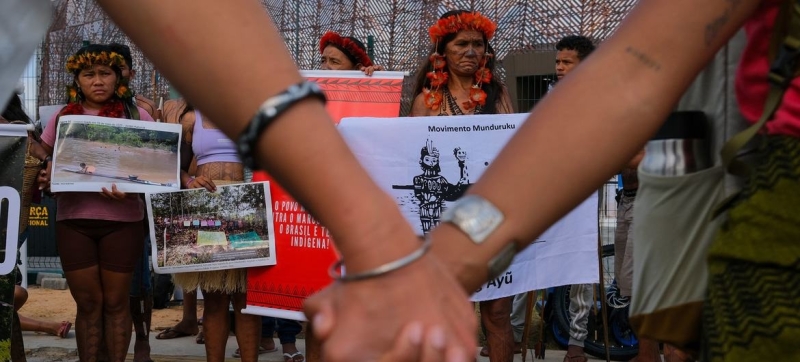- BNP weighing review of some nominations amid grassroots unrest |
- US presses for Gaza resolution as Russia offers rival proposal |
- 35 crude bombs, bomb-making materials found in Geneva Camp |
- 8 Islamic parties want referendum before polls, neutral admin |
- Stocks sink on week’s last trading day; DSEX plunges 122 points |
Indigenous Protesters Block COP30 Entrance, Demand Action

Munduruku Indigenous Peoples protest at the UN Climate Conference in Belém, Brazil.
Around 90 Indigenous people from the Munduruku community staged a peaceful protest early Friday, blocking the main entrance to the Blue Zone — the restricted area reserved for negotiators — at COP30 in Belém. Access was halted for about an hour, and the army was called in to reinforce security.
The Munduruku, who live primarily in the Amazon states of Amazonas, Mato Grosso and Pará, are demanding an end to projects and extractive activities that threaten Indigenous territories, particularly in the Tapajós and Xingu River basins.
‘Legitimate’ protests and government response
COP30 Executive Director Ana Toni described the demonstrations as “legitimate” and confirmed that the government is listening. Protesters were directed to meet with the Minister of Indigenous Peoples, Sônia Guajajara, and the Minister of the Environment and Climate Change, Marina Silva.
Ms Toni noted that COP30 includes more than 900 Indigenous participants — a major increase from the 300 registered at last year’s conference in Baku, Azerbaijan.
“Brazil has a strong democracy that allows for different forms of protest, both inside and outside the conference,” she said, adding that hosting COP30 in the Amazon ensures that Indigenous voices are meaningfully included.
Indigenous youth underline urgency
For Indigenous youth attendees, the protest reflects both the urgency of their demands and the importance of being present at an international forum.
Amanda Pankará, from the Pankará people in Pernambuco, said that COP30 provides a platform where Indigenous concerns can gain global visibility.
“We would have much more to contribute if more Indigenous people were participating in these discussions. These demands are valid. We are claiming the right to land, the right to life… Being here today, representing those who haven’t had the opportunity to be here, reinforces our presence and responsibility. We are the ones who create this protective barrier, so we want to be heard.”
Commitment to climate action
During a meeting held on Thursday, many Indigenous leaders described COP30 as the most inclusive climate conference they had ever attended.
Chilean Indigenous youth Emiliano Medina — from the Mapuche people — said representatives reaffirmed their commitment to combating the climate crisis. He added that protests such as Friday’s highlight where policies fall short.
“Similar demonstrations have been taking place around the world in communities affected by climate change,” he said.
‘COP in the Amazon is meant to hear these voices’
Ana Toni stressed that hosting COP30 in the Amazon makes broad Indigenous participation possible — something that would have been more limited if the event were held in Rio de Janeiro, São Paulo or Brasília. She said the voices of demonstrators are being heard and noted that more protests are expected throughout the conference.
“The purpose of holding a conference in the Amazon is precisely to listen to these demands,” she said.

